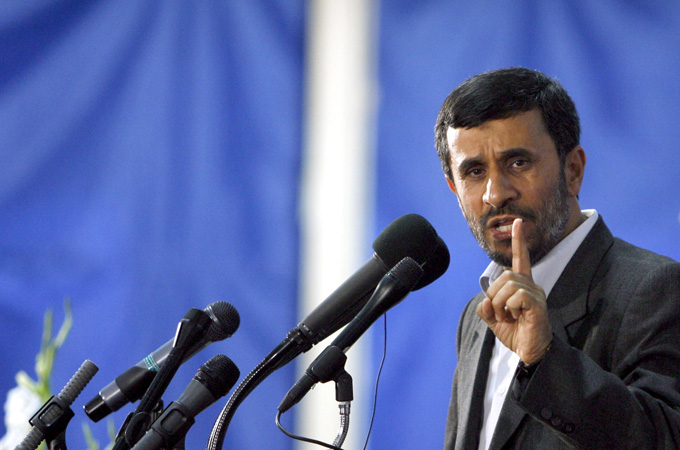Pushing Iran towards a nuclear bomb
Western leaders’ current tactics to deter Iran from developing nuclear weapons will likely backfire, writes author.

 |
| So far, Iranian President Mahmoud Ahmadinejad and other leaders have expressed no interest in developing nuclear weapons [EPA] |
New Haven, Connecticut – The United States and its Western allies have utilised nearly every tool at their disposal to stop Iran from obtaining nuclear weapons, from sanctions and sabotage to cyber attacks and assassinations. In their zeal, however, Western leaders risk hastening the very thing that they seek to prevent: an Iranian bomb.
It has become increasingly obvious that Iran and the West are now at a state of war, albeit a covert one. Mysterious explosions have rocked the Iranian countryside, while suspected Western intelligence agents have targeted nuclear scientists for assassination.
For Iran’s part, recent months have seen a plot to assassinate the Saudi ambassador in Washington, the storming of the British Embassy, the downing of a US stealth drone, and threats to close the Strait of Hormuz. American observers have heard a lot about these events; what they haven’t heard about is the high likelihood that Iran will retaliate for what it views as acts of war.
Experts widely believe that if Iran were hit by an Israeli airstrike it would retaliate by, among other things, expelling international inspectors and committing to obtaining nuclear weapons. While an Israeli attack remains a distant possibility, it is more likely that Western intelligence agencies will expand covert actions like the Stuxnet virus and targeted assassinations.
The question, then, is how will Iran respond to these escalations? Based on its past experience, the Iranian regime might seize upon what it views as Western aggression to use as a pretext for building nuclear weapons.
In the 1980s, the revolutionary leaders of the new Islamic Republic of Iran swore off weapons of mass destruction (WMD) as un-Islamic. During the course of the war, however, Saddam Hussein’s Iraq used chemical weapons against Iranian troops, spurring Ayatollah Khomeini to reverse his position and restart the country’s chemical weapons programme. In the process, Khomeini established the philosophical foundation for a key principle within the Islamic Republic known as “maslahat-e nizam” or “expediency of the system”, by which the needs of the Islamic Republic as a political institution might trump even Islamic law.
This suggests that Iran’s commitments not to develop WMD in the early 1980s carried an implicit understanding that the religious prohibition on such weapons does not necessarily apply in a state of war.
So far, Tehran’s leaders have declared that they have no interest in nuclear weapons, citing the same religious opposition as before. The US intelligence community has repeatedly assessed that if Iran wanted to develop atomic bombs, it has the scientific, technical and industrial capacity eventually to do so. Then why hasn’t Iran put its technical know-how to use building up a nuclear arsenal? Experts widely agree that Tehran has yet to form a consensus in favour of actually building the bomb, and in the absence of such a consensus prefers merely to keep the option open for the future.
Whether or not Iran builds a nuclear weapon, then, will be based on Tehran’s cost-benefit calculation. Fundamentally, the future of Iran’s nuclear programme will be decided within the context of Iran’s larger foreign policy strategy, which Iran’s leaders have characterised as a policy of responding to pressure with pressure. Therefore, the easiest way for Iran to arrive at a consensus in favour of building nuclear weapons would be in response to a provocation from the West.
For the US, the current dynamic with Iran contains a real danger of sleepwalking toward disaster. The goal of Western policy toward Iran is to delay Iran’s actual acquisition of a bomb through sabotage, assassinations, cyber attacks and other covert activities. But this is tragically misaligned with the reality of Iranian decision-making.
Trying to dissuade an actor from doing something they don’t actually intend to do can easily backfire. The danger in this case is that current Western strategy will trigger a nationalistic “rally round the flag” effect in Iran. Indeed, it already has.
The result of all this may be to actually provoke a more aggressive Iranian response than would otherwise have been the case. The focus of Western policy has been on imposing pressure in order to give Iran’s leaders a reason not to weaponise.
Equally important, however, and far too often overlooked, is the need to take care not to give Iran a reason to weaponise – which is exactly what current policy runs the risk of doing.
Patrick Disney is currently a graduate student at Yale University focusing on Iran and nuclear nonproliferation. He previously served as the Assistant Policy Director for the National Iranian American Council.
Follow him on Twitter:@TalkingWarheads
The views expressed in this article are the author’s own and do not necessarily reflect Al Jazeera’s editorial policy.
